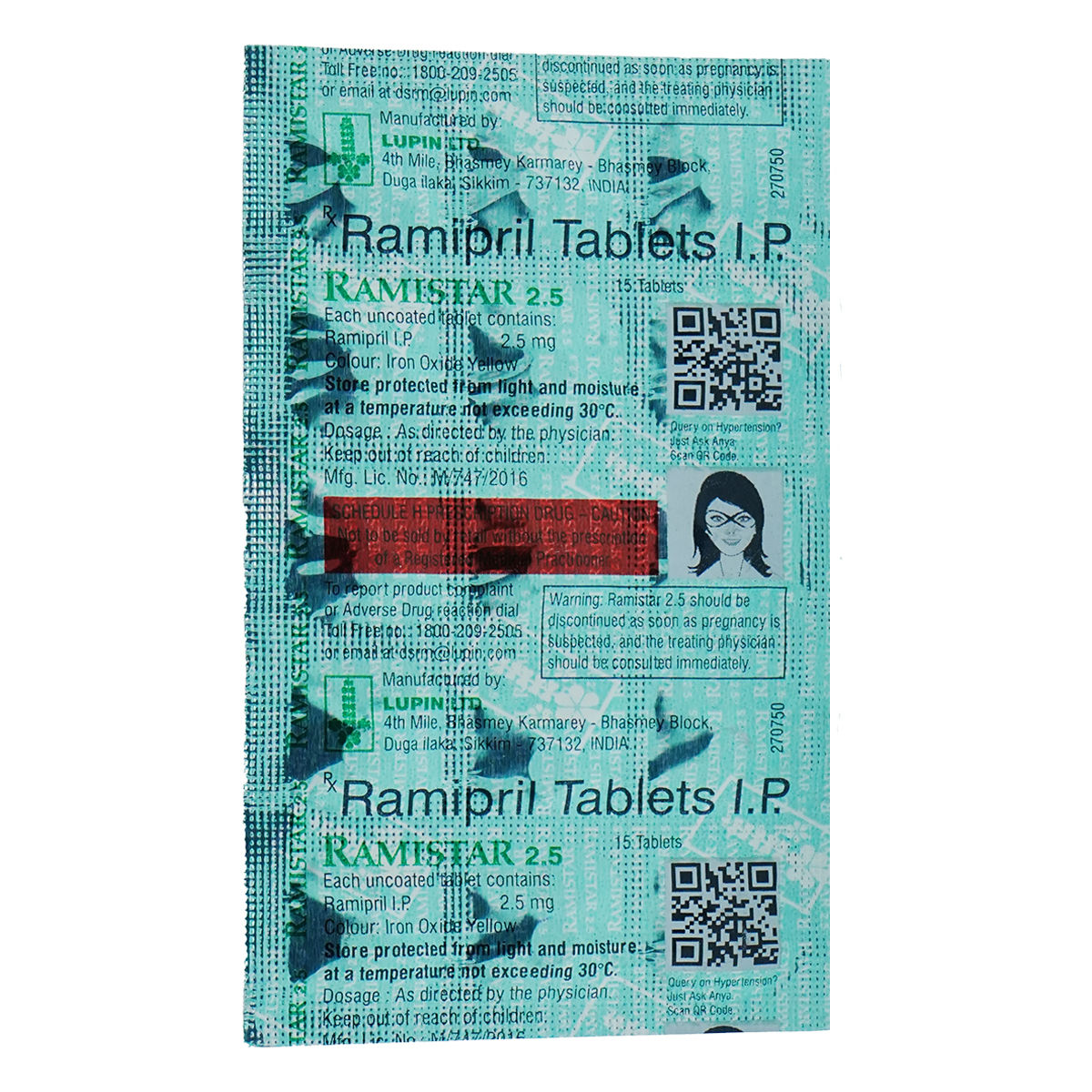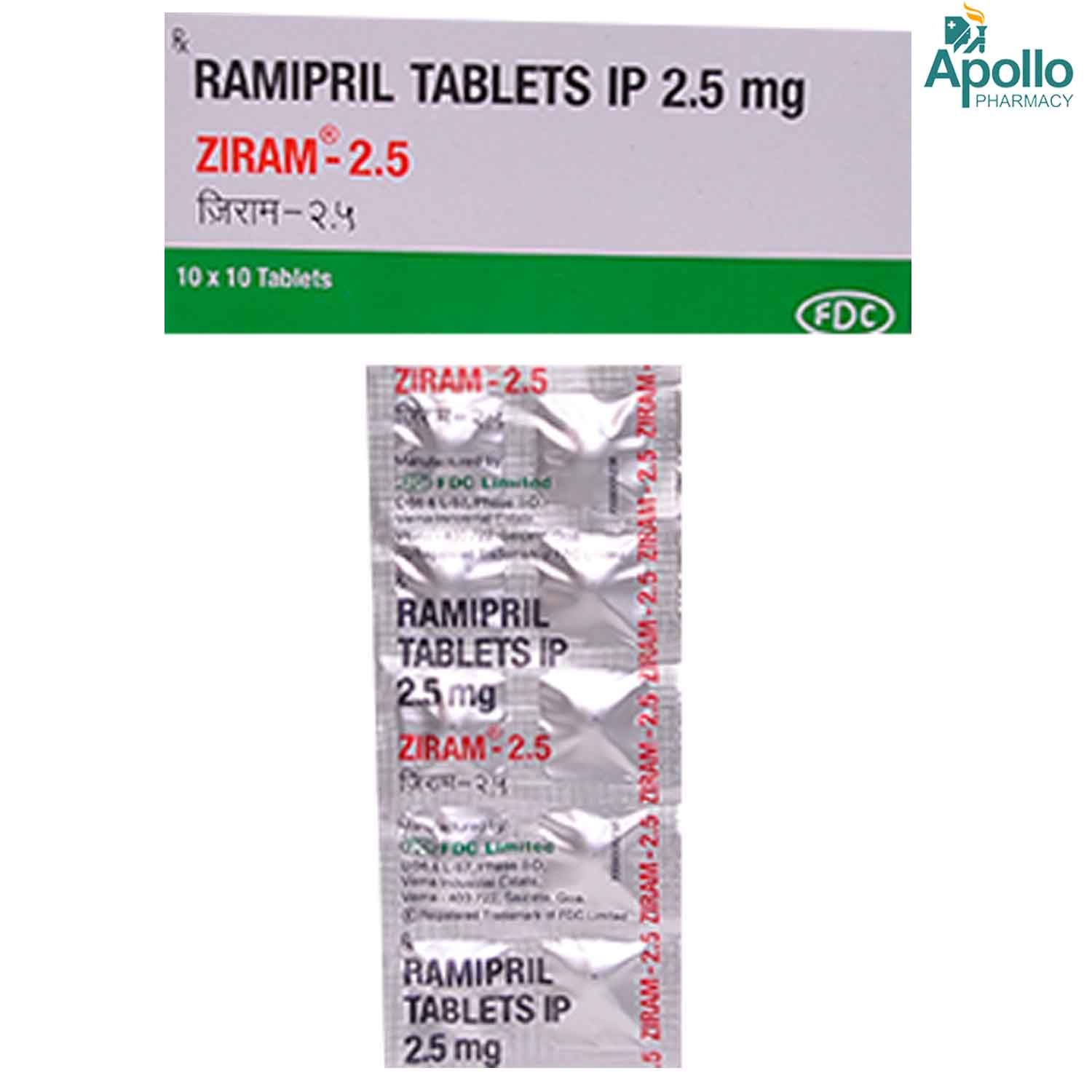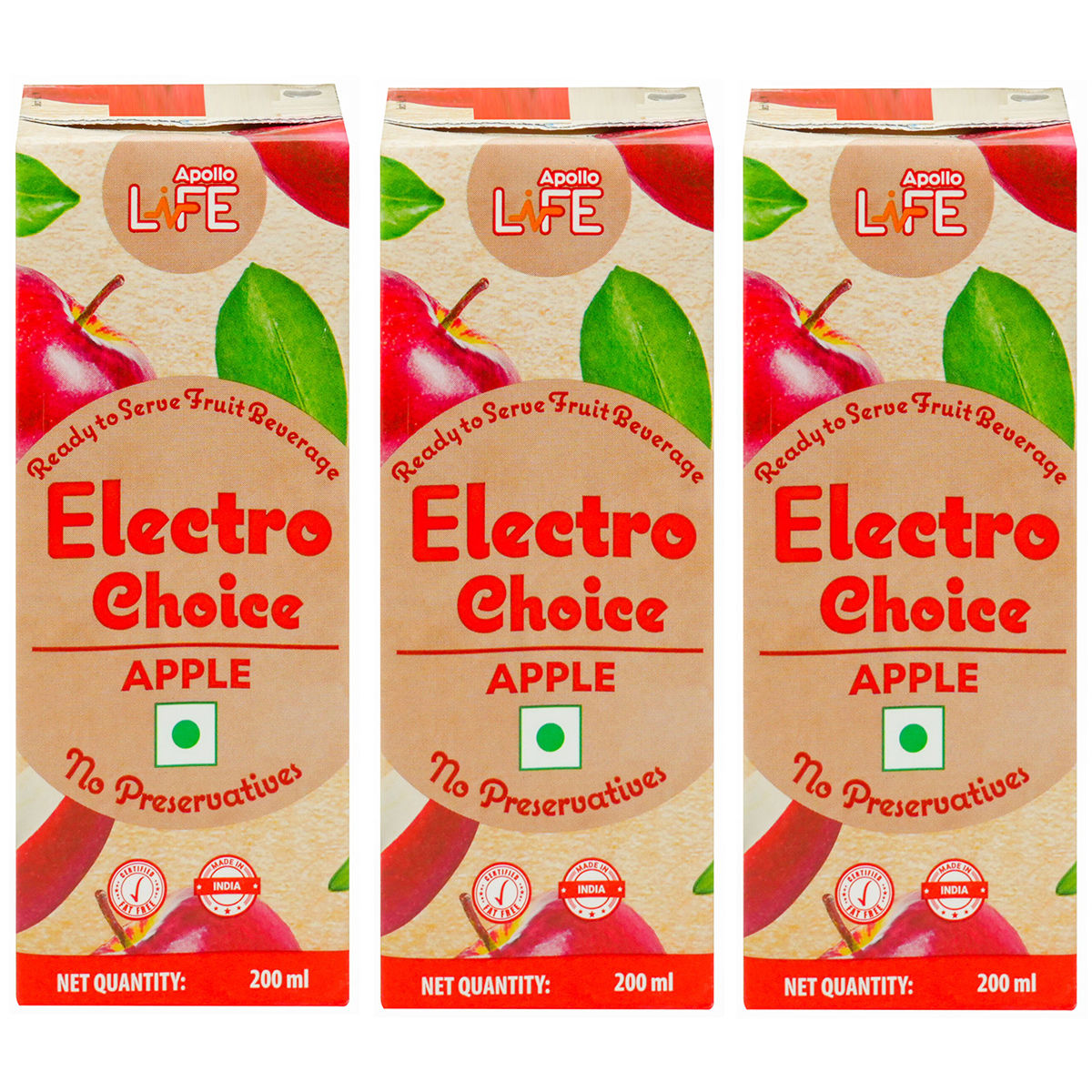Cardace 2.5 mg Tablet 15's
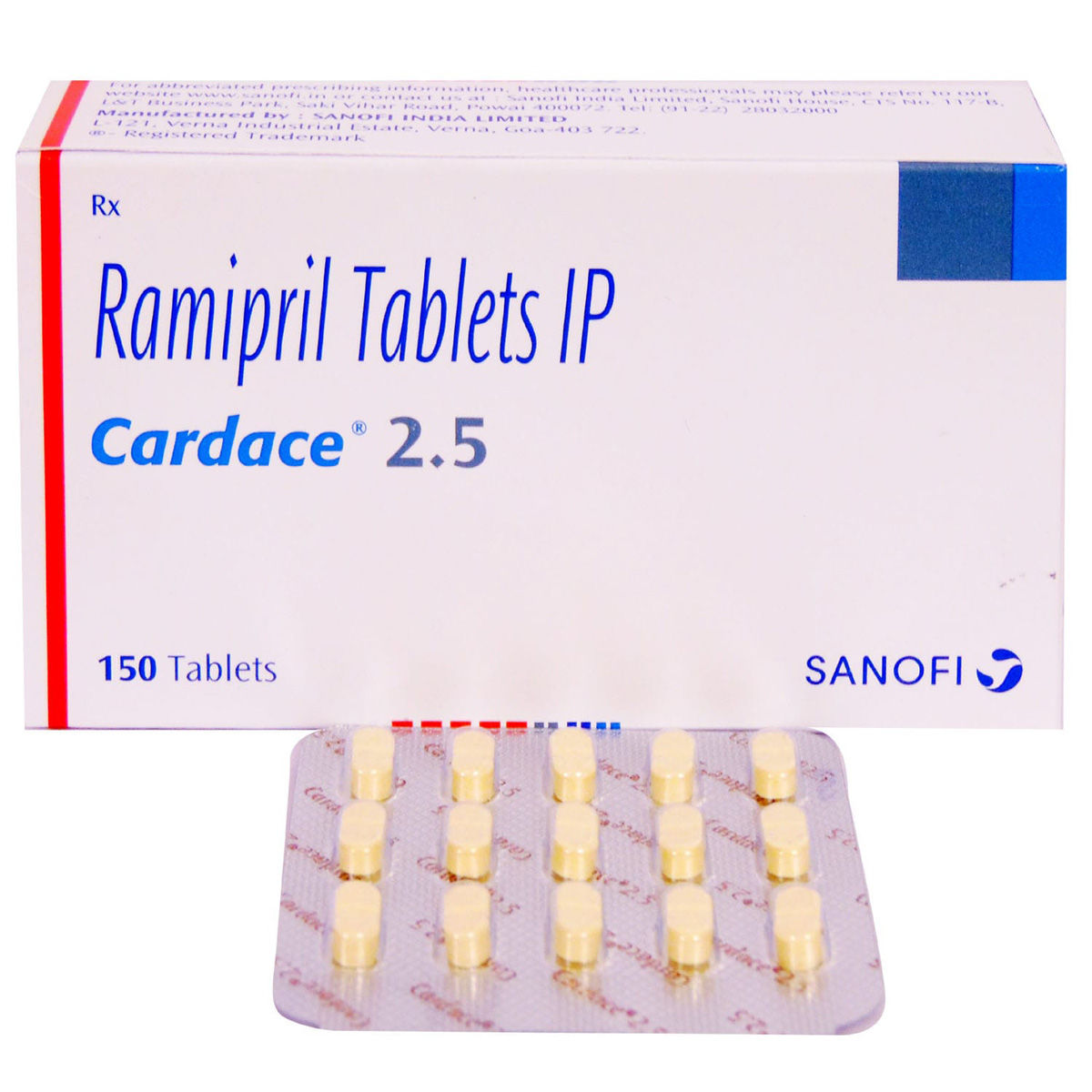
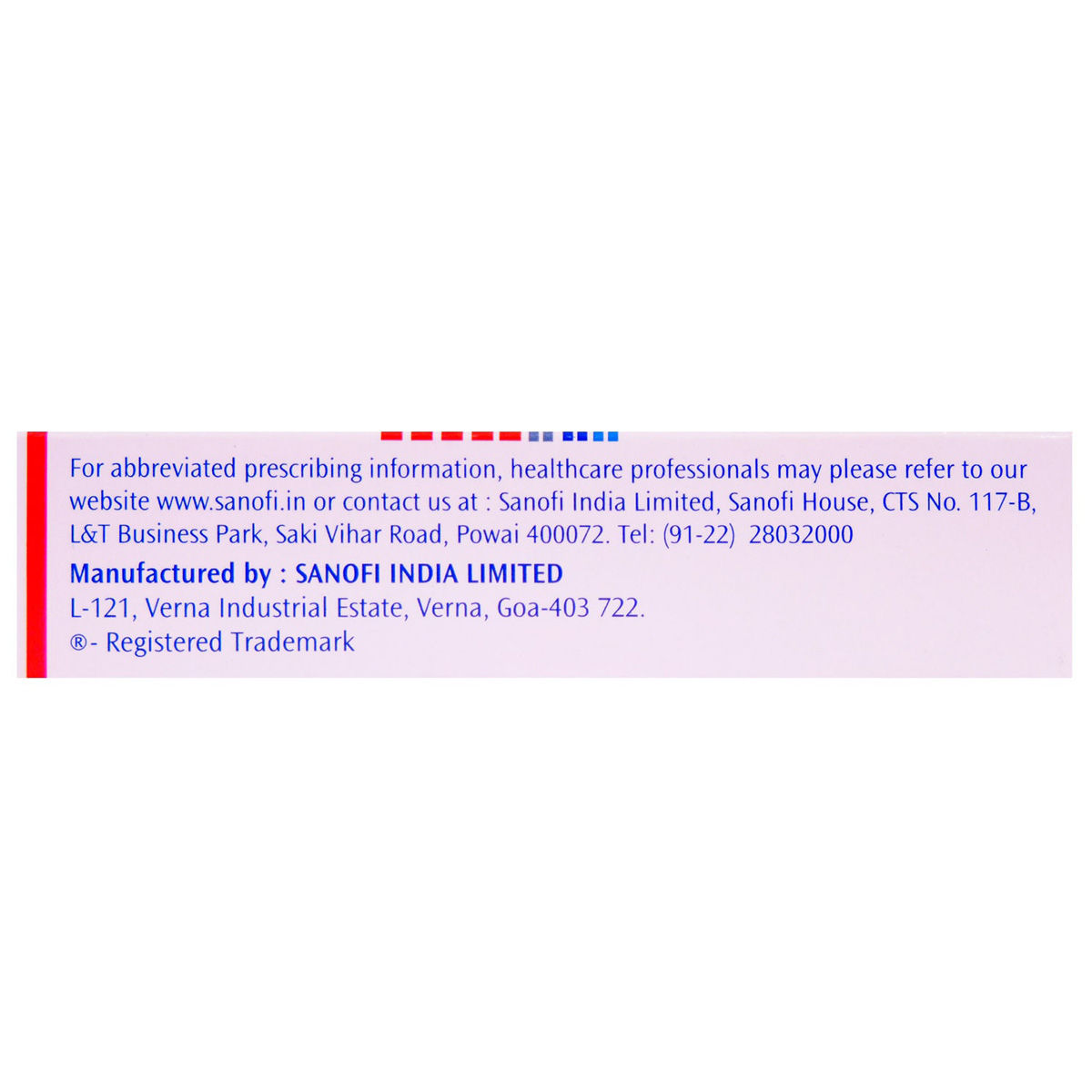
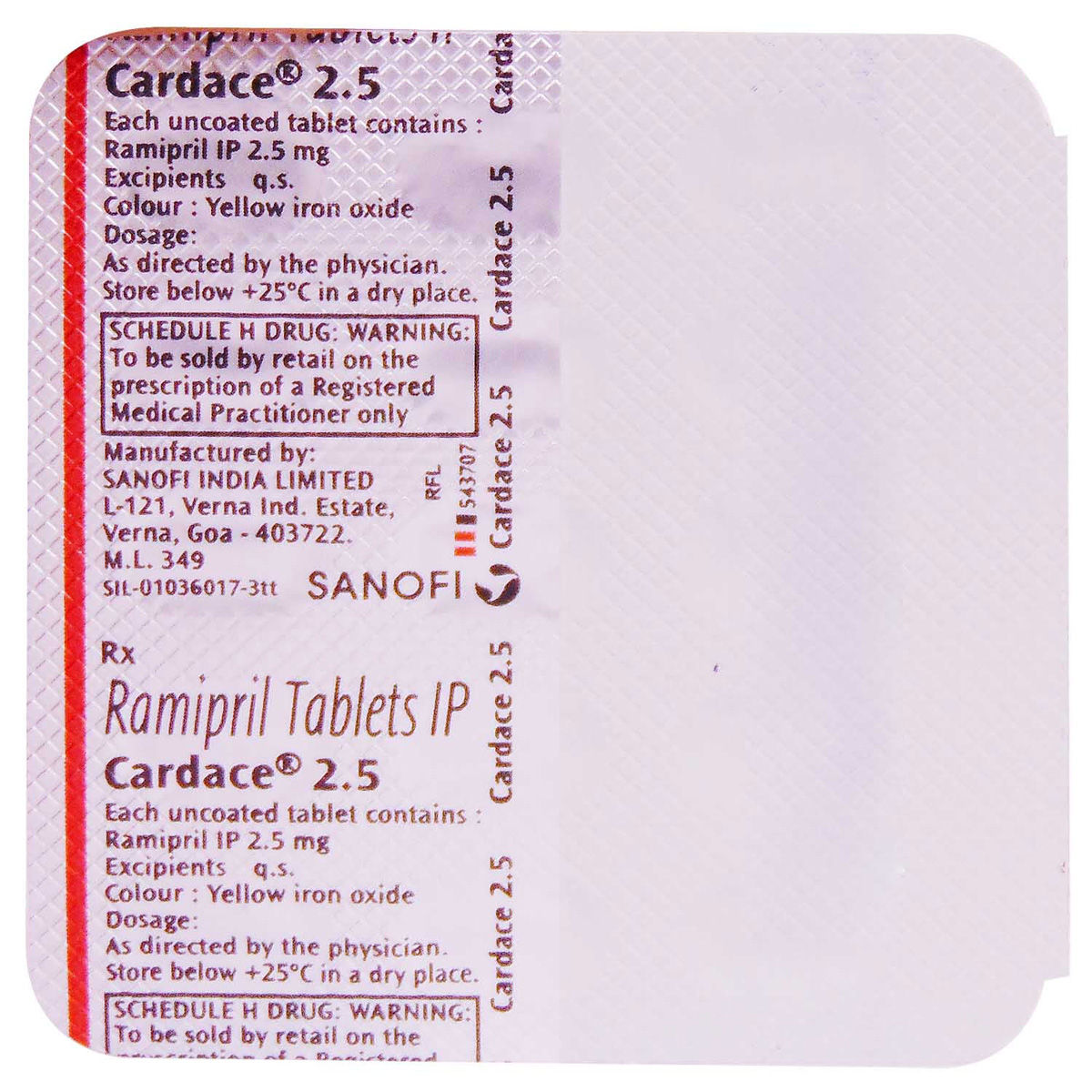
₹78.3*
MRP ₹87
10% off
₹73.95*
MRP ₹87
15% CB
₹13.05 cashback(15%)
Free Delivery
With Circle membership
(Inclusive of all Taxes)
This offer price is valid on orders above ₹800. Apply coupon PHARMA10/PHARMA18 (excluding restricted items)
Know Your Delivery Time
Provide Delivery Location
Selected Pack Size:15
15 ₹78.3
(₹5.22 per unit)
In Stock
10 ₹50
(₹5 per unit)
In Stock
Available Offers
 Prescription drug
Prescription drugWhats That
 366 people bought
366 people bought 
Secure Payment

India's Most Trusted Pharmacy

Genuine Products
Composition :
Manufacturer/Marketer :
Consume Type :
Return Policy :
Expires on or after :
About Cardace 2.5 Tablet
Cardace 2.5 Tablet is used to treat high blood pressure (hypertension) and reduce the risk of having a heart attack, stroke or heart failure. High blood pressure is a chronic condition in which the pressure in the blood vessels is high.
Cardace 2.5 Tablet contains 'Ramipril' that relaxes and widens the blood vessels, making it easier for the heart to pump blood to all parts of the body, thereby lowering the raised blood pressure and reducing the risk of having a heart attack, stroke or heart failure.
Take Cardace 2.5 Tablet with or without food. Do not chew, crush, or break Cardace 2.5 Tablet . Swallow it as a whole with a glass of water. Take Cardace 2.5 Tablet at the same time every day. In some cases, Cardace 2.5 Tablet may cause common side effects like headache, dizziness, fatigue, and cough. Most of these side effects do not require medical attention and will resolve gradually over time. Talk to your doctor if you experience these side effects persistently.
Try not to stop taking it on your own as it may cause a sudden increase in blood pressure, chest pain or heart attack. Regular monitoring of blood pressure, electrolyte levels, and kidney function is advised while taking Cardace 2.5 Tablet . Avoid taking Cardace 2.5 Tablet if you are pregnant or breastfeeding. Talk to your doctor, he/she may prescribe you alternate medicine. Cardace 2.5 Tablet is not recommended for children below 18 years of age as efficacy and safety have not been established.
Uses of Cardace 2.5 Tablet
Directions for Use
Medicinal Benefits
Cardace 2.5 Tablet is used alone or in combination with other medicines to treat high blood pressure. Cardace 2.5 Tablet relaxes and widens the blood vessels, making it easier for the heart to pump blood to all parts of the body. This helps in lowering blood pressure and the risk of having a heart attack or stroke. Cardace 2.5 Tablet helps in reducing both standing and lying down blood pressure without any orthostatic effect (sudden decrease in blood pressure which might occur when a person stands up suddenly). However, when dehydrated Cardace 2.5 Tablet may show an orthostatic effect. Continued usage of Cardace 2.5 Tablet helps in decreasing the severity of heart failure, rate of hospitalization and symptoms such as weakness and shortness of breath.
How Cardace 2.5 Tablet Works
Storage
- If you experience low blood pressure symptoms like dizziness, lightheadedness, or fainting while taking medication, seek immediate medical attention.
- Make lifestyle modifications and adjust your medication regimen under medical guidance to manage low blood pressure.
- As your doctor advises, regularly check your blood pressure at home. Record your readings to detect any changes and share them with your doctor.
- Fluid intake plays a vital role in managing blood pressure by maintaining blood volume, regulating blood pressure, and supporting blood vessel function. Drinking enough fluids helps prevent dehydration, maintain electrolyte balance, and regulate fluid balance.
- Take regular breaks to sit or lie down if you need to stand for long periods.
- When lying down, elevate your head with extra pillows to help improve blood flow.
- Avoid heavy exercise or strenuous activities that can worsen low blood pressure.
- Wear compression socks as your doctor advises to enhance blood flow, reduce oedema, and control blood pressure.
- If symptoms persist or worsen, or if you have concerns about your condition, seek medical attention for personalized guidance and care.
- Tell your doctor about the cough symptoms you're experiencing, which may be triggered by your medication.
- Your doctor may adjust your treatment plan by changing your medication, adding new medications, or providing guidance on managing your cough symptoms.
- Practice good hygiene, including frequent handwashing, avoiding close contact with others, and avoiding sharing utensils or personal items.
- Stay hydrated by drinking plenty of fluids, such as water, tea, or soup, to help thin out mucus and soothe your throat.
- Get plenty of rest and engage in stress-reducing activities to help your body recover. If your cough persists or worsens, consult your doctor for further guidance.
- Confusion is a major psychotic disorder that needs immediate medical attention.
- Acknowledge your experience and put effort to control confusion.
- Avoid smoking and alcohol intake as it can worsen the condition and increase your confusion.
- Practice meditation and yoga to avoid anxiety, which can be one of the leading causes.
- Talk to your dietician and consume food that can improve your mental health.
- Always wear loose-fitting clothes which are suitable for your activity.
- Include the diet containing fruits like watermelon, grapes, bananas and green leafy vegetables.
- Drink plenty of water stay hydrated.
- Avoid moving more and staying in hot sun.
- Hydrate your body: Drink enough water to prevent dehydration and headaches.
- Calm Your Mind: Deep breathing and meditation can help you relax and relieve stress.
- Rest and Recharge: Sleep for 7-8 hours to reduce headache triggers.
- Take rest: lie down in a quiet, dark environment.
- Cold or warm compresses can help reduce tension.
- Stay Upright: Maintain good posture to keep symptoms from getting worse.
- To treat headaches naturally, try acupuncture or massage therapy.
- Over-the-counter pain relievers include acetaminophen and ibuprofen.
- Prescription Assistance: Speak with your doctor about more substantial drug alternatives.
- Severe Headaches: Seek emergency medical assistance for sudden, severe headaches.
- Frequent Headaches: If you get reoccurring headaches, consult your doctor.
- Headaches with Symptoms: Seek medical attention if your headaches include fever, disorientation, or weakness.
- Inform your doctor about dizziness symptoms. They may adjust your medication regimen or prescribe additional medications to manage symptoms.
- Follow your doctor's instructions for taking medication, and take it at the same time every day to minimize dizziness.
- When standing up, do so slowly and carefully to avoid sudden dizziness.
- Avoid making sudden movements, such as turning or bending quickly, which can exacerbate dizziness.
- Drink plenty of water throughout the day to stay hydrated and help alleviate dizziness symptoms.
- If you're feeling dizzy, sit or lie down and rest until the dizziness passes.
- Track when dizziness occurs and any factors that may trigger it, and share this information with your doctor to help manage symptoms.
- Inform your doctor about the nausea and discuss possible alternatives to the medication or adjustments to the dosage.
- Divide your daily food intake into smaller, more frequent meals to reduce nausea.
- Opt for bland, easily digestible foods like crackers, toast, plain rice, bananas, and applesauce.
- Avoid certain foods that can trigger nausea, such as fatty, greasy, spicy, and smelly foods.
- Drink plenty of fluids, such as water, clear broth, or electrolyte-rich beverages like coconut water or sports drinks.
- Use ginger (tea, ale, or candies) to help relieve nausea.
- Get adequate rest and also avoid strenuous activities that can worsen nausea.
- Talk to your doctor about taking anti-nausea medication if your nausea is severe.
- Record when your nausea occurs, what triggers it, and what provides relief to help you identify patterns and manage your symptoms more effectively.
What if I have taken an overdose of Cardace 2.5 Tablet
Drug Warnings
Do not take Cardace 2.5 Tablet if you are allergic to any of its contents. Talk to your doctor if you have heart, kidney or liver problems. Cardace 2.5 Tablet may sometimes cause a decrease in blood pressure than normal, especially in dehydrated people, who are taking diuretics (medicines to treat oedema) and have low levels of sodium. Avoid taking Cardace 2.5 Tablet if you are pregnant or breastfeeding. Talk to your doctor, he/she may prescribe you alternate medicine. Cardace 2.5 Tablet is not recommended for children below 18 years of age as efficacy and safety have not been established. Inform your doctor about all the medicines you are taking and about your health condition to rule out any unpleasant side effects. Consult your doctor if you have lost a lot of body fluids through vomiting, diarrhoea or sweating more than normal or if you are taking low water tablets to treat oedema (diuretics), or if you undergo dialysis. Inform your doctor that you are taking Cardace 2.5 Tablet if you are due to undergo any surgery or dental procedure; your doctor may advise you to stop taking Cardace 2.5 Tablet one day before receiving an anaesthetic to undergo any surgery or dental procedure.
Drug-Drug Interactions
Drug-Drug Interactions
Login/Sign Up
Taking aliskiren together with Cardace 2.5 mg Tablet may increase the risk of serious side effects such as kidney problems, low blood pressure, and high potassium levels in the blood. High levels of potassium can develop into a condition known as hyperkalemia, which in severe cases can lead to kidney problems, muscle paralysis and irregular heart rhythm.
How to manage the interaction:
Taking Cardace 2.5 mg Tablet with Aliskiren is not recommended, but can be taken if prescribed by a doctor. However, consult your doctor if you feel nausea, vomiting, weakness, confusion, tingling in the hands and feet, a sensation of heaviness in the legs, a weak pulse, or a slow or irregular heartbeat. You must drink enough fluids while taking these medications. It is advised to reduce the intake of foods high in potassium, including tomatoes, raisins, figs, potatoes, lima beans, bananas, plantains, papayas, pears, cantaloupes, mangoes. Do not discontinue any medications without a doctor's advice.
Taking Cardace 2.5 mg Tablet with telmisartan may increase the risk of side effects such as low blood pressure, kidney function impairment, and high blood potassium.
How to manage the interaction:
Although there is a possible interaction, telmisartan can be taken with Cardace 2.5 mg Tablet if prescribed by the doctor. Consult the prescriber if you experience symptoms of high potassium such as nausea, vomiting, weakness, confusion, tingling of the hands and feet, feelings of heaviness in the legs, a weak pulse, or a slow or irregular heartbeat. Maintain adequate fluid intake during treatment with these medications. Do not discontinue the medications without consulting a doctor.
Taking Cardace 2.5 mg Tablet with Candesartan may increase the risk of side effects such as low blood pressure, kidney function impairment, and a condition called hyperkalemia (high blood potassium).
How to manage the interaction:
Although taking Cardace 2.5 mg Tablet together with Candesartan can possibly result in an interaction, they can be taken together if prescribed by your doctor. However, consult your doctor if you experience nausea, vomiting, weakness, confusion, tingling of the hands and feet, feelings of heaviness in the legs, a weak pulse, or a slow or irregular heartbeat You must drink enough fluids while taking these medications. Do not stop taking any medication without consulting your doctor.
Co-administration of Allopurinol with Cardace 2.5 mg Tablet may increase the risk of severe allergic reactions and infections.
How to manage the interaction:
Although there is a possible interaction between Allopurinol and Cardace 2.5 mg Tablet, you can take these medicines together if prescribed by your doctor. However, if you develop throat tightness, shortness of breath, itching, rash, swelling of the face, lips, or tongue, fever, and/or muscle pain or weakness, contact your doctor immediately. Also, let your doctor know if you notice signs of infection or experience chills, fever, sore throat, extreme tiredness, body pains, or other flu-like symptoms. Do not discontinue the medication without consulting a doctor.
Taking Potassium citrate with Cardace 2.5 mg Tablet may increase potassium levels in the blood. High potassium levels can lead to kidney problems, muscle paralysis, and abnormal heart rhythm.
How to manage the interaction:
Although there is a possible interaction between Potassium citrate and Cardace 2.5 mg Tablet, you can take these medicines together if prescribed by your doctor. However, consult the doctor if you experience nausea, vomiting, weakness, disorientation, tingling in your hands and feet, feelings of heaviness in your legs, a weak pulse, or a slow or irregular heartbeat. It is essential to maintain proper fluid intake while taking these medications. It is advised to reduce the intake of potassium-rich foods. Do not discontinue any medications without a doctor's advice.
Taking Cardace 2.5 mg Tablet with Valsartan may increase the risk of side effects (low blood pressure, kidney function impairment, and hyperkalemia (high blood potassium).
How to manage the interaction:
Although taking Cardace 2.5 mg Tablet together with Valsartan can result in an interaction, they can be taken together if prescribed by a doctor. However, consult a doctor if you feel nausea, vomiting, weakness, confusion, tingling in the hands and feet, a sensation of heaviness in the legs, a weak pulse, or a slow or irregular heartbeat. You must drink enough fluids while taking these medications. Do not stop taking any medication without consulting a doctor.
Coadministration of Cardace 2.5 mg Tablet together with losartan may increase the risk of side effects such as low blood pressure, kidney function impairment, and a condition called hyperkalemia (high blood potassium).
How to manage the interaction:
Taking Losartan with Cardace 2.5 mg Tablet together can result in an interaction, it can be taken if your doctor has advised it. However, if you notice any nausea, vomiting, weakness, confusion, tingling of the hands and feet, feelings of heaviness in the legs, or irregular heartbeat, you should contact a doctor immediately. Avoid taking a potassium-rich diet (tomatoes, raisins, figs, potatoes, lima beans, bananas, plantains, papayas, pears, cantaloupes, mangoes) while taking these medications. Do not stop using any medications without talking to a doctor.
Taking Cardace 2.5 mg Tablet together with Irbesartan may increase the risk of side effects such as low blood pressure, kidney function impairment, and a condition called hyperkalemia (high blood potassium).
How to manage the interaction:
Although taking Irbesartan with Cardace 2.5 mg Tablet together can possibly result in an interaction, it can be taken if a doctor has prescribed it. However, consult a doctor if you experience nausea, vomiting, weakness, disorientation, tingling in your hands and feet, feelings of heaviness in your legs, or a slow or irregular heartbeat. Do not discontinue any medications without a doctor's advice.
Taking Azilsartan medoxomil with Cardace 2.5 mg Tablet may cause low blood pressure, kidney function impairment, and increased potassium levels in the blood.
How to manage the interaction:
Although taking Cardace 2.5 mg Tablet together with Azilsartan medoxomil can result in an interaction, they can be taken together if prescribed by a doctor. However, consult a doctor if you experience vomiting, weakness, confusion, tingling in the hands and feet, or palpitations. Do not discontinue any medications without a doctor's advice.
Taking Cardace 2.5 mg Tablet and amiloride together may increase the levels of potassium in your blood.
How to manage the interaction:
Although taking amiloride along with Cardace 2.5 mg Tablet can result in an interaction, they can be taken together if prescribed by a doctor. However, consult the doctor if you feel weakness, confusion, numbness or tingling, and uneven heartbeats. Do not stop taking any medication without consulting a doctor.
Drug-Food Interactions
Drug-Food Interactions
Login/Sign Up
Lentils, Orange Juice, Oranges, Raisins, Potatoes, Salmon Dried, Spinach, Sweet Potatoes, Tomatoes, Coconut Water, Beans, Beetroot, Broccoli, Bananas, Apricots, Avocado, Yogurt
How to manage the interaction:
Consuming potassium-rich foods while using Cardace 2.5 mg Tablet may increase the potassium levels in your blood. It is recommended to avoid potassium-rich foods while using Cardace 2.5 mg Tablet. If you experience a fast heartbeat, shortness of breath, chest pain, nausea, or vomiting, consult your doctor immediately.
Diet & Lifestyle Advise
- You are advised to consume low salt and low-fat diet while taking Cardace 2.5 Tablet .
- Regular exercise is also recommended to complement treatment with Cardace 2.5 Tablet .
- Eat a diet rich in whole grains, vegetables, and fruits.
- Avoid smoking and alcohol consumption.
- Maintain a healthy weight with proper diet and exercise.
- Managing stress with meditation, yoga, and massage would also help treat high blood pressure.
Habit Forming
Therapeutic Class
Cardace 2.5 Tablet Substitute

AB-Ramprel 2.5 mg Tablet 10's
by Others
₹5.20per tabletRamistar 2.5 Tablet 15's
by AYUR
₹5.22per tabletRamcor-2.5 Capsule 10's
by Others
₹4.68per tabletHopace-2.5 Tablet 15's
by Others
₹5.22per tabletRamipres 2.5 Tablet 10's
by Others
₹5.22per tablet
Product Substitutes
Alcohol
Unsafe
You are recommended to avoid alcohol consumption while taking Cardace 2.5 Tablet to avoid unpleasant side-effects. Alcohol intake might interfere with the working of Cardace 2.5 Tablet . Please consult your doctor if you have any concerns regarding this.
Pregnancy
Unsafe
It is not recommended to take Cardace 2.5 Tablet while you are pregnant. Please consult your doctor if you have any concerns regarding this, your doctor will decide whether Cardace 2.5 Tablet can be given to pregnant women or not.
Breast Feeding
Unsafe
It is not recommended to take Cardace 2.5 Tablet while you are breastfeeding. Please consult your doctor if you have any concerns regarding this, your doctor will decide whether Cardace 2.5 Tablet can be given to breast-feeding mothers or not.
Driving
Caution
Cardace 2.5 Tablet may cause dizziness, do not drive or operate heavy machinery if you feel dizzy.
Liver
Caution
Dose adjustment may be needed. Cardace 2.5 Tablet should be used with caution in patients with liver impairment/liver disease. Please consult your doctor if you have any concerns regarding this.
Kidney
Caution
Dose adjustment may be needed. Cardace 2.5 Tablet should be used with caution in patients with kidney impairment/kidney disease. Please consult your doctor if you have any concerns regarding this.
Children
Unsafe
Cardace 2.5 Tablet should not be used by children as the efficacy and safety has not been established.
FAQs
Cardace 2.5 Tablet is used to treat high blood pressure (hypertension) and reduce the risk of heart attack, stroke or heart failure.
Cardace 2.5 Tablet belongs to the group of medicines called Angiotensin Converting Enzyme (ACE) Inhibitors that works by lowering the body’s production of substances that could increase the blood pressure. Cardace 2.5 Tablet relaxes and widens the blood vessels making it easier for the heart to pump blood to all parts of the body. This helps in lowering the blood pressure and the risk of having a heart attack or stroke.
If you are diabetic you should monitor your blood glucose levels often especially in the first few weeks because Cardace 2.5 Tablet can lower glucose/sugar levels in blood. However, please consult your doctor before taking Cardace 2.5 Tablet if you are diabetic.
Please do not stop taking Cardace 2.5 Tablet without consulting your doctor on your own as it may lead to rise in blood pressure. Continue taking Cardace 2.5 Tablet for as long as your doctor has prescribed it to you. Do not be reluctant to speak with your doctor if you experience any difficulty while taking Cardace 2.5 Tablet .
Orthostatic hypotension could be a side-effect of Cardace 2.5 Tablet , especially in people who are dehydrated. Orthostatic hypotension is a sudden lowering in blood pressure leading to dizziness on standing. If you experience this, do not try to stand up suddenly or start walking, instead lie down and get up slowly only when you feel better. People taking Cardace 2.5 Tablet are advised to regularly monitor their blood pressure levels to avoid such unpleasant events.
Do not overdose on Cardace 2.5 Tablet or any medicine as it could lead to very unpleasant side-effects. Take Cardace 2.5 Tablet only as prescribed by your doctor. Overdose of Cardace 2.5 Tablet can cause increased heartbeat, dizziness and sleepiness. Rush to your nearest doctor as early as possible if you have overdosed on Cardace 2.5 Tablet .
No, it is not a blood thinner. Ramipril is an angiotensin-converting enzyme (ACE) inhibitor. It is utilized for multiple indications, including hypertension and prevention of heart failure progression following a myocardial infarction (MI).
Cardace 2.5 Tablet contains Ramipril, which is an angiotensin-converting enzyme (ACE) inhibitor, stimulates the cough reflex.
Ramipril helps to avoid future strokes, heart attacks, and kidney difficulties. It also increases your chances of survival if you take it to treat heart failure or after a heart attack.
Ramipril can cause hyperkaliemia, an unhealthy state that can lead to death. Your doctor will check your potassium levels, especially if you take additional medications. If you develop any potassium-related symptoms, contact your doctor immediately.
Ramipril reduces high blood pressure within a few hours, but full action may take a few weeks.
A dry, persistent cough is a common adverse effect of Ramipril, a medicine used to treat high blood pressure and certain cardiac diseases. This is because ramipril, an angiotensin-converting enzyme (ACE) inhibitor, stimulates the cough reflex. Cough treatment is usually ineffective, but it may ease on its own or resolve after a few days to a month. If it persists, consult the doctor.
Inform your doctor that you are taking Cardace 2.5 Tablet if you are due to undergo any surgery or dental procedure; your doctor may advise you to stop taking Cardace 2.5 Tablet one day before receiving an anaesthetic to undergo any surgery or dental procedure.
There is no conclusive evidence that Cardace 2.5 Tablet affects fertility in men or women. However, Ramipril is not suggested during pregnancy, so consult your doctor if you are attempting to conceive.
Yes, Cardace 2.5 Tablet can reduce blood sugar and may interact with antidiabetic medications and insulin. Suppose you have diabetes and are using Ramipril. In that case, you should monitor your blood sugar more frequently, particularly in the first few weeks. Your doctor may also need to change your diabetes treatment plan.
Stopping Cardace 2.5 Tablet may cause your blood pressure to rise. This may increase your risk of heart attack and stroke. If you're bothered by side effects, your doctor may be able to prescribe you a different medicine.
Cardace 2.5 Tablet is usually considered safe for long-term use. In fact, it works best when taken consistently over time. However, using Ramipril for an extended period may cause your kidneys to function less effectively. Your doctor will use regular blood tests to determine how well your kidneys operate.
Yes, Cardace 2.5 Tablet can be taken with or without food.
Cardace 2.5 Tablet may cause common side effects like headache, dizziness, fatigue, and cough. Most of these side effects do not require medical attention and will resolve gradually over time. Talk to your doctor if you experience these side effects persistently.
It's not yet known how much Ramipril passes into breast milk, but it's likely to be a small amount. It is unlikely to cause side effects in your baby. However, there is a very small risk that it could also lower your baby's blood pressure. Your doctor might recommend a different medicine for you to take while breastfeeding.
Cardace 2.5 Tablet is not recommended in pregnancy. It can affect your baby's kidneys, especially if it's taken in the second and third trimesters of pregnancy. This can result in long-term damage to your baby's kidneys.
Cardace 2.5 Tablet can interact with various medicines. So, do not consume any other medications along with Cardace 2.5 Tablet unless recommended by the doctor.
Talk to your healthcare professional before taking Cardace 2.5 Tablet if you have any underlying medical condition or are taking any medications. Also, ask for advice about precautions and limitations of Cardace 2.5 Tablet .
The time it takes to see results with Cardace 2.5 Tablet may vary depending on many factors. It is important to follow the recommended dosage and treatment regimen and consult a healthcare professional for ongoing monitoring.
Cardace 2.5 Tablet is usually taken orally. Swallow the tablet as a whole with a glass of water. Do not crush, chew or break it. Take it at the same time every day for effective results.
Cardace 2.5 Tablet contains Ramipril, an angiotensin-converting enzyme (ACE) inhibitor.
If you forget to take a dose of Cardace 2.5 Tablet , take the missed dose as soon as you remember it. However, if it is almost time for the next dose, skip the missed dose and continue your regular dosing schedule. Do not take a double dose to make up for a missed one.
Do not take more than the prescribed dose of Cardace 2.5 Tablet , as it may cause an overdose. If you suspect you have taken an overdose, please consult a doctor immediately.
Country of origin
Manufacturer/Marketer address
Customers Also Bought
Disclaimer
Author Details
We provide you with authentic, trustworthy and relevant information
Recommended for a 30-day course: 2 Strips













